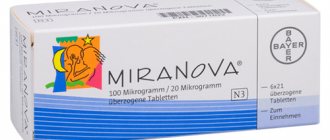In this article we will study the question of whether and how to protect yourself from pregnancy during or after menopause.
50 is a certain milestone when age-related changes occur in a woman’s body. The figure is not absolutely accurate, because for some, menopause is possible at 45, and for others at 55. But all women have one small amendment by nature, which many forget to take into account. And for this reason, they let their intimate life take its course - and this is completely wrong! We invite you to study the question of whether you need to protect yourself from pregnancy after 50 years, and we will also help you choose the most suitable method of contraception for you.
Features and nuances of contraception after 45 years
In the female body, reproductive function is limited by time. After the age of 45, there is a decline in sex hormones, which provokes the appearance of menopause symptoms. Its initial stage is called premenopause. On average it lasts 3 years. During this period, a woman notices a disruption in the regularity of her cycle, a decline in her health, and the appearance of initial signs of aging. The following factors can speed up the process of destruction of the body:
- abuse of alcoholic beverages;
- constant stressful situations;
- neglect of visits to the gynecologist;
- serious chronic diseases;
- smoking.
During menopause, reproductive function does not completely disappear. Critical days are coming less and less often, but ovulation is still present. Due to the disrupted cycle, a woman’s vigilance decreases. For this reason, the risk of developing an unplanned pregnancy increases. Oral contraceptives are considered a suitable option in this case. The pills normalize the cycle and help avoid unwanted conception.
What changes occur during menopause
Menopause or menopause is the cessation of a woman's reproductive function. In other words, after this event occurs, the woman will not be able to give birth to a child.
But menopause does not occur overnight - it is a fairly long period of time, which includes several stages during which different events occur. We will consider in detail whether it is necessary to use protection during each stage.
The menopausal period has the following components:
- Premenopause is the stage from the appearance of the first menopausal symptoms to the last menstrual bleeding. Your periods become irregular and ovulation does not occur with every menstrual period. A woman can become pregnant, carry and give birth to a child. But it should be taken into account that women giving birth in adulthood have a high risk of complications after childbirth, and in newborns the likelihood of genetic abnormalities increases. Therefore, you should constantly use protection at this stage, unless a late pregnancy is planned.
- Menopause is essentially the name given to the last menstruation. It can only be determined retrospectively. The doctor determines the onset of menopause when there has been no menstrual bleeding for 1 year after the last menstruation. To confirm the diagnosis, the woman takes several blood tests for hormones and undergoes a gynecological examination. Sometimes, periods stop for a year or more due to hormonal imbalance, and then resume. If ovulation occurs during menopause, there is a high chance of pregnancy. Therefore, it is very difficult to independently diagnose the end of reproductive age. After all, after the age of forty, hormonal disorders are not uncommon in the female body. Before visiting a doctor, you need to protect yourself.
- Postmenopause is the last stage in which there are no more periods and pregnancy does not occur. If you have a regular partner, you don’t need to use protection at this stage.
What contraceptives are recommended at 45-50 years old?
There are several types of contraceptives. The most common means of barrier contraception are considered. But in adulthood, doctors advise resorting to more reliable and convenient contraceptives. These include:
- intrauterine devices;
- birth control pills;
- spermicides;
- female condom.
Contraceptive pills after 45 years are selected after a comprehensive examination. When choosing, a number of significant factors are taken into account. Most often, mature women are prescribed gestagenic hormonal contraceptives. They reduce the likelihood of malignant tumors in the reproductive organs. These drugs do not contain estrogen.
In some cases, women of late reproductive age are prescribed low-dose birth control pills. They are well tolerated, regardless of age and health status. Drugs in this area include:
Femoston is one of the options for treating symptoms in menopausal women
To understand how HRT works, you can look at the effects of a drug commonly prescribed in Europe. Femoston is a medicine containing hormones - micronized 17β-estradiol and dydrogesterone.
Femoston
There are 3 different pharmaceutical forms of the drug with different dosages, selected individually by the gynecologist.
For example, Femoston 1 mg / 10 mg is a cyclic treatment in low doses, i.e. estrogens are administered continuously, and gestagens - for 14 days. After taking them, the patient experiences bleeding. The packs contain 28 tablets, taken 1 tablet at a time without a break. Each tablet contains 1 mg of 17β-estradiol, and the last 14 tablets contain 10 mg of dydrogesterone. The drug is used if the last menstruation was less than a year before the start of treatment. This combination of hormones is usually well tolerated. Adverse reactions occur rarely. Common ones include: headache, pain in the back, stomach or chest, hypersensitivity of the mammary glands.
A continuous hormone therapy regimen is used if the last menstrual period was more than a year in menopausal women or more than 2 years before the onset of premature ovarian failure. In this case, the medicine contains 28 tablets. Each tablet contains the same ratio of 17β-estradiol and dydrogesterone. The drug is taken daily, 1 tablet without a break.
This treatment option is indicated for women suffering from symptoms of estrogen deficiency or for the prevention of osteoporosis in women at increased risk of fractures who cannot tolerate or are prohibited from taking other medications to prevent osteoporosis. The protective effect on bone depends on the dose of estrogen. Research has shown that hormones introduced during perimenopause have long-lasting protective effects on bones for many years even after discontinuation.
What dose of drugs for HRT should I choose? The general rule is that the optimal dose and duration of treatment are individualized based on the severity of symptoms and response to the prescribed treatment.
Treatment is often started with the lowest but effective dose of estrogen, i.e. preparation containing 1 mg of estradiol 17-β. If symptoms persist for approximately 2–3 months, the dose is increased. For most women, a low dose of 1 mg of estrogen is sufficient to relieve symptoms. Very low doses of estradiol 0.5 mg are effective in controlling subjective symptoms and maintaining bone mineral density in postmenopausal women.
According to the International Menopause Society, dydrogesterone, which is included in HRT drugs, is associated with a better breast cancer risk profile than synthetic progestins. But HRT in any case should not be used by women diagnosed with:
- breast cancer;
- pathology of the uterine mucosa;
- unexplained genital bleeding;
- venous thromboembolism (deep vein thrombosis, pulmonary embolism);
- thrombophilic embolism;
- arterial thrombolysis;
- acute liver disease;
- porphyria;
- allergies to the active substance.
Breast cancer
Contraindications and side effects
Any hormonal-based medications have a powerful effect on a woman’s health. Therefore, before using contraceptives, you need to become familiar with the contraindications. Among them are the following:
- migraine;
- embolism or thrombosis;
- liver or kidney failure;
- suspicion of the presence of tumors whose growth depends on hormones;
- uterine bleeding of unknown origin;
- hereditary predisposition to arterial thrombosis;
- diabetes;
- pregnancy;
- allergy to constituent components.
The likelihood of adverse symptoms occurring during the use of birth control pills during menopause cannot be calculated in advance. The body's reaction can be unpredictable. Before you start taking the pills, you need to familiarize yourself with the most common side symptoms. These include:
- headache;
- decreased sexual desire;
- intermenstrual bleeding of a bloody nature;
- mood swings;
- deterioration of skin and hair;
- change of weight category;
- nausea and vomiting;
- swelling;
- skin manifestations of allergies.
Rules for taking birth control pills after 45 years
Hormonal contraceptives are usually taken according to a certain schedule. Reception begins on day 1 of the cycle. For each day, 1 tablet is provided. They are taken daily, always at the same time. Violation of the dosage regimen and skipping a pill lead to a decrease in contraceptive effect. Tablets from a pack are taken for 28 days. This is followed by a break of a week. During this period, bloody discharge occurs, acting as menstruation. The protective effect lasts throughout the cycle.
List of modern contraceptives for women over 45 years of age
When choosing birth control pills for women over 45 years of age, preference is given to the more modern ones. Mini-pills have a minimal content of synthetic hormones. They are less likely to cause side effects, but are not inferior to their analogues in effectiveness. Combination tablets are no less in demand.
Mini-pill
Birth control pills, classified as mini-pills, are taken if standard contraceptives are contraindicated for some reason. These pills are great after 45 years. Their advantages include the possibility of use for varicose veins and during preparation for surgery. Additional effects of the mini-pill include the fight against endometriosis and inflammatory processes. Prominent representatives of this group of contraceptives are considered:
Doctors' opinion
The use of contraceptives during early menopause is a good solution for preventing and eliminating the signs of a crisis period. But before taking it, it is important to exclude the possibility of contraindications. For these purposes, a detailed examination of all life support systems is carried out.
When using contraceptive therapy, a woman should undergo regular preventive examinations with a female doctor. They allow you to detect the depressing effects of taking pills in time. To avoid undesirable consequences of treatment, it is advisable to quit smoking and increased physical activity. It is also important to monitor the condition of the cardiovascular system.
You still need a condom. And timely analyzes too2
Doctors and social health workers in all civilized countries, however, insist on the use of condoms at any age. It turned out that recently, as 50-year-olds have become more sexually active, rates of STDs among this age group have increased significantly.
Since 2005, the risk of syphilis among older adults has jumped 67%; chlamydia - by 40%. Venereologists and sexologists recommend using condoms every time for all those who have sex. However, it is still necessary to get tested regularly for STDs.
What is HRT?
The search for the elixir of youth is a problem that has been relevant for thousands of years. Hormone replacement therapy in the form of drugs for women after 45 years of age is an effective way to prolong youth and maintain quality of life. HRT in women can be considered as a deception of the body, which is no longer able to produce the necessary hormones on its own. How dangerous is the use of hormone replacement therapy for the female body?
The media contain conflicting information about the rationality of using hormones.
A negative attitude towards the prescription of HRT drugs appeared due to the following circumstances:
- the risk of interference with the natural processes of aging of the body with the risk of disruption of hormonal regulation;
- insufficient awareness of the population about the effectiveness and safety of new generation HRT;
- fear of side effects;
- the assumption that synthetic analogues of hormones cannot be dosed without knowing the body’s real need for them;
- fear of developing cancer due to the use of hormone replacement drugs.
You can figure out where the myth is and where the reality is by understanding the mechanism of action of hormones.
To ensure coordinated functioning of the body while maintaining a constant internal environment, the hormonal system functions on the principle of feedback between the body systems and the brain (pituitary gland, hypothalamus).
Releasing hormone synthesized in the hypothalamus stimulates the production of follicle-stimulating and luteinizing hormones. They, in turn, provoke the production of sex hormones. These include the following:
- Estrogen. They stimulate the proliferation of the endometrium, the epithelium of the vaginal mucosa, control the growth of the mammary glands, and maintain the elasticity of blood vessels. They directly affect the preservation of female beauty and skin tenderness.
- Progesterones. Smoothes out the proliferative effect of the hormone estrogen. Participate in preparing the body for pregnancy or the full course of the menstrual cycle.
- Androgens. Participate in the synthesis of estrogens, blood and liver proteins, regulate blood glucose levels. These hormones are responsible for sexual desire, aggression, and initiative.
The imbalance of hormones observed with age-related changes is provoked by the following factors:
- depletion of follicular reserves and hormonal dysfunction as a result of aging;
- decreased sensitivity of the hypothalamus to hormones;
- hereditary factor (genetic predisposition);
- disruption of hormone metabolism in the body;
- surgical manipulations, removal of reproductive system organs (ovaries, uterus, appendages);
- uncontrolled use of hormonal drugs.
Indications for prescribing HRT
- Severe menopausal manifestations in the form of hot flashes, chills, hyperhidrosis, palpitations, increased blood pressure, migraines. Autonomic memory and sleep disturbances, depression, decreased libido are typical manifestations of menopause.
- Removal of the uterus, ovaries, and appendages contributes to the onset of artificial menopause. In this case, hormone replacement therapy for women in the form of the latest generation drugs is vital.
- Disorders of the genitourinary system in the form of pain during urination, false urges, urinary incontinence, dryness and burning in the intimate area.
- Prolapse of the uterus and vagina as a result of hormonal deficiency.
- Disruption of metabolic processes in organs and tissues (severe swelling due to difficulty removing fluid from the body, increased blood glucose levels).
- Structural changes in the epidermis (dryness, flaking, hair loss and fragility, delamination of nail plates, appearance of deep wrinkles).
- Development of systemic diseases of the endocrine and nervous systems (diabetes mellitus, coronary heart disease, myocardial infarction, atherosclerosis, Alzheimer's disease). In this case, a special approach to prescribing a treatment regimen and determining the dosage is required. If you have a genetic predisposition to osteoporosis, HRT is a necessary protection for bone tissue.
Hormonal therapy can be of 2 types:
- Short-term (3-6 months). Its goal is to eliminate or prevent menopausal syndrome (including those arising from the use of various medications).
- Long-term (5-7 years). It is aimed at preventing the development of late menopausal manifestations against the background of existing systemic diseases.
Drugs
The list of new generation drugs with proven effectiveness includes:
Utrozhestan. A progesterone-based drug promotes secretory transformations in the uterine mucosa. It has antiandrogenic activity, promotes the formation of new cells and cellular structures. In combination with estrogen drugs, it eliminates menopausal syndrome. The drug is indicated for women for the prevention of uterine fibroids and endometriosis. During menopause, it must be taken regularly in the form of capsules orally or intravaginally. Luteina, Progestogel, Crinon, Duphaston act similarly.
What is menopause? Isn't this a disease?
The content of the article
Menopause is a physiological period of life for all women, which occurs on average at the age of 51.3 years. This is a major shock to the body, where decreased production of estrogen and progesterone can lead to a variety of symptoms that impair quality of life.
Phases of menopause
Female sex hormones, estrogens and progesterone, are mainly produced by the ovarian follicles. The maximum number of follicles is located in the ovaries of the fetus, still in the womb. At birth, their number is already smaller, and subsequently constantly decreases.
Around the age of 50, ovarian function gradually ceases, and the balance and synthesis of secreted hormones is disrupted. Ovulation in the ovaries occurs less frequently or disappears completely, which means that the corpus luteum, which produces progesterone, is no longer formed, reducing its levels in the body. Estrogen is still being produced, resulting in a relative excess of estrogen. The consequence of the process is an irregular menstrual cycle and dysfunctional bleeding.
Early menopause symptoms often begin during premenopause. These are vasomotor symptoms such as:
- tides;
- sweating (especially at night);
- heartbeat;
- headache;
- dizziness;
- noise in ears;
- chills;
- bloating;
- changes in blood pressure.
Headache
Psychological symptoms are also possible:
- depressed mood;
- anxiety;
- increased irritability;
- mood swings;
- insomnia or drowsiness;
- lack of energy;
- decreased libido.
During this period, a woman often does not connect the above psychological complaints with the impending menopause and therefore turns not to a gynecologist, but to a therapist. The doctor prescribes sedatives or antidepressants. This is not correct: if you have symptoms of menopause, you need to go to a gynecological clinic and treat hormonal problems, and not their consequences.
In 2013, the British Menopause Society recommended that doctors provide health and lifestyle counseling to all women over 50 years of age. And also for each patient to draw up an individual treatment plan during menopause and beyond, thus ensuring a longer and healthier life. It is emphasized that the greatest opportunity to prevent negative symptoms is early menopause.
Guidelines from the British Menopause Society state that even short-term use of hormones using HRT at the beginning of menopause improves mood and relieves depression. In this case, the so-called domino effect is triggered due to the disappearance of vegetative symptoms and a direct antidepressant effect. Psychiatric counseling is recommended for women suffering from severe depression or when there is no improvement after hormonal treatment.
Over the years, follicle reserves are depleted and less and less estrogen is produced, so based on feedback, the pituitary gland secretes even more follicle-stimulating hormones (FSH) and luteinizing hormones (LH). Even a stimulated ovary stops secreting sex hormones (estrogen and progesterone) - menopause occurs.
On average, 3-5 years after menopause, intermediate symptoms include urogenital disorders:
- vaginal dryness;
- itching;
- painful sexual intercourse;
- vaginal descent;
- frequent and painful urination;
- recurrent urinary tract infections;
- urinary incontinence.
Frequent and painful urination
Atrophy of connective tissue and impaired collagen synthesis lead to hair loss, nail fractures, thinning and dry skin, pain in bones and joints. These signs relate to symptoms of late menopause, osteoporosis, cardiovascular diseases, senile dementia (dementia).
Each woman experiences this period individually. Since the main cause of these symptoms is a lack of sex hormones, the most effective treatment to improve a woman's quality of life is hormone treatment. In gynecology, a combination of estrogen (E) and estrogen/progestin (E/P) is used to reduce the symptoms of estrogen deficiency.
TOP 3 best contraceptive drugs for women after 45
There is a wide range of contraceptives on the shelves of pharmacies. Many women during their reproductive years prefer birth control pills, considering them easy to use and reliable in use.
An important aspect is that, if desired, you can easily refuse them. It is very important that when choosing a drug, a lady does not forget to take into account her age. In this publication we will look at which birth control pills are best to use after 45 years of age.
Pregnancy during menopause
Medicine knows cases of pregnancy after 45 years of age, which most often was unplanned and ended in abortion. A woman’s tissues at this age lose elasticity and firmness, making it difficult to dilate the cervix and perform a high-quality abortion that will not lead to serious complications.
The consequences of late abortions are inflammation of the genital organs, endometriosis, uterine fibroids, and the development of cancer.
After the cessation of menstruation, a woman’s ovaries retain follicles with eggs for another three to five years, so protection during menopause is mandatory. An egg ready for fertilization increases the possibility of getting pregnant, and menstruation can temporarily resume even a year after it has completely stopped. However, women often confuse menstruation with bleeding, which can be a sign of serious illness. To prevent this from happening, after 40 years you should visit a gynecologist at least twice a year.
Features of contraception after 45 years
Normally, after 45 years of age, women begin menopause, which gynecologists romantically call the golden autumn.
The following main phases of this life stage are distinguished:
- Premenopause - begins with the first symptoms of menopause. It is characterized by a gradual decrease in the production of sex hormones by the ovaries. A woman's menstrual cycle begins to change. During this phase, only part of the cycles occur with ovulation. Therefore, it is more difficult for a woman to become pregnant than before, but the likelihood of this event occurring remains high.
- Menopause or menopause is a woman's last independent period. Normally they come at age 50. They can only be determined retrospectively. A gynecologist diagnoses a woman as having menopause when there has been no menstruation for 12 months.
- Postmenopause is the final phase in which the ovaries completely stop working and menstruation no longer comes. The body adjusts its work to low levels of sex hormones.
When the first symptoms of menopause appear before the age of forty, they speak of early menopause. With timely and competent treatment, it is possible to delay early menopause. If menopause occurs after 55 years, then doctors diagnose late menopause. Many representatives of the fair sex are interested in whether contraception is needed during menopause or whether it is already possible to stop using protection.
Since follicles with eggs remain in the ovaries for 3-5 years after the cessation of menstruation, the World Health Organization has developed clear recommendations for women in this regard.
If menopause occurs in a woman under 50 years of age, then contraception should be used for another 2 years. When a woman reaches menopause after 50 years of age, she needs to take protection during 1 year of absence of menstruation.
The benefits of birth control after forty
After a woman crosses the age of forty, she begins to take the issue of contraceptives seriously, especially since doctors are wary of late pregnancies.
Childbirth in adulthood can result in a number of pathologies in the child, and abortion will affect the woman’s health. Therefore, contraception is the only safe way to prevent pregnancy.
Hormonal pills for women are the usual form. Oral contraceptives have been refined and improved over the course of 50 years, and as a result they managed to reduce the amount of the hormone, that is, they became low-dose, which led to a sharp reduction in side effects when used. If you take the pills correctly and according to the established schedule, then they will be safe for the body.
In addition to protection, modern contraceptives have the following advantages:
- Significantly reduces the likelihood of an ectopic pregnancy or uterine fibroids.
- Eliminate cysts in the ovaries.
- There is a positive effect on the skin and nails, as well as hair. Modern medicine has introduced the concept of beauty contraception, when a mature lady takes pills and feels great.
- With regular use of hormones, the cycle is leveled out, and the loss of hormones is gradually restored.
- The risk of inflammatory diseases of the genital organs is reduced (by 50-80%).
- The effectiveness of the tablets against ovarian, rectal and uterine cancer has been clinically proven. The positive effect remains for another 20 years after stopping taking hormonal drugs.
Article on the topic:
What do elevated platelets in women indicate? Causes, symptoms and treatment
Women in the premenopausal period should be more careful and monitor their health. It is at this age that the likelihood of developing cancer increases. In addition, even after the end of menstruation, the risk of pregnancy remains.
Classification of birth control pills
All contraceptives in the form of tablets are divided into two groups: hormonal and non-hormonal.
The first group is in turn divided into subgroups:
- Combined oral contraceptives or COCs for short. They contain artificial analogues of female sex hormones - estrogens and gestagen. The pharmaceutical market offers monophasic, biphasic and triphasic drugs. All monophasic tablets contain the same amount of estrogens and gestagen. There are 2 types of tablets in the package of two-phase preparations. They differ from each other in different amounts of gestagens. Moreover, they have the same amount of estrogens. A three-phase hormonal drug has 3 types of tablets, which differ from each other in different amounts of gestagen and estrogens in the composition.
- Progestin oral contraceptives (OGC), also known as mini-pills. They contain only gestagen - an analogue of the female hormone progesterone.
Modern hormonal contraceptive pills contain microdoses of estrogens and gestagen. Non-hormonal pills are not taken orally, but are inserted into the vagina immediately before sexual intercourse. Before choosing any drug, you should consult a gynecologist.
Possible contraception during menopause
For protection during menopause, oral contraceptives or intrauterine devices, which can only be prescribed by a doctor, are suitable. Among oral medications, it is advisable to give preference to contraceptives with gestagens that do not affect blood clotting, liver function and fat metabolism.
To prevent cancer of the uterus and ovaries, gynecologists recommend the use of low-dose progestin drugs with a long-term effect.
During menopause, modern women actively use barrier contraception or spermicides, which have a contraceptive, antimicrobial and moisturizing effect. These products help eliminate vaginal dryness that occurs during menopause. Spermicides can also serve as an addition to traditional contraceptives such as condoms, hormonal pills or intrauterine devices.
Remember that gynecologists categorically do not recommend taking emergency contraception such as Postinor, which contains shock doses of hormones that have an extremely negative effect on the body. Means of contraception during menopause should be selected with a gynecologist, who, when choosing contraception, will take into account all diseases and changes in the female reproductive system.
What medications should be preferred during perimenopause?
During perimenopause, hormonal changes occur. This leads to the appearance of menopausal symptoms: hot flashes, irritability, nervousness, tearfulness, depression, headaches, etc.
Only in some female representatives the manifestations of menopause are of low intensity and do not cause much discomfort. Most women require medical attention.
Indications for taking birth control pills
For women over 45 years of age who have no contraindications, it is advisable to take combined microdose contraceptives. Tablets with estrogen not only have a high degree of protection against unplanned pregnancy and reduce the intensity of menopausal symptoms, but also have an antiandrogenic effect.
With the onset of premenopause, the level of estrogen in a woman’s blood decreases, and the amount of male sex hormones androgens increases. As a result of such changes, a woman begins to grow hair according to the male pattern: above the upper lip, on the chin, stomach, hips and even back. The skin becomes oily and thicker.
When the drug contains estrogens, they increase the level of the hormone in the woman’s blood and prevent the described changes in appearance. This is the antiandrogenic effect. They also reduce the risk of developing concomitant diseases during menopause: osteoporosis, atherosclerosis and others. Taking them prevents the appearance of tumors in the uterus and appendages.
How to protect yourself from pregnancy after 50 years: hormonal contraception
As you age, your risk of cardiovascular disease (heart attack, stroke, or thrombosis) increases. And any hormonal drugs further increase the likelihood of these diseases. However, the risk of heart attack or stroke is low in women who do not smoke or have high blood pressure or high blood lipid levels. However, the risk of thrombosis increases without these indicators.
If no other methods of contraception are being considered and there are no risk factors, low-dose combination pills can be taken after age 50. However, it is important to regularly monitor blood pressure, blood lipid levels and other adverse factors for cardiovascular disease and thrombosis.
- Tablets - there are many different types. They contain almost all combinations of the two female hormones estrogen and progestin (hence the name "combination pill"). They differ partly in dosage, composition of hormones and method of administration.
- But gynecologists do not recommend consuming them after 50 years of age, because they are associated with an increased risk of developing thrombosis and cardiovascular diseases. These risks increase with age and are exacerbated by taking pills. Although they are able to relieve menopausal syndrome and cope with depression.
- If you choose combined tablets, it is better to choose ones with a small concentration of hormones, preferably the latest generation. They have much less side effects and will have the right effect on your body. The best choice would be: Marvelon
- Novinet
- Femoden
- Regulon
- Triquilar
- Silest
- Mercilon
- Triziston
Important: Do not self-medicate! Choose any hormonal drugs with the advice of a gynecologist!
Hormonal pills after 50 have risks!
- The vaginal ring is a hormonal contraceptive that is affordable and easy to use. A flexible plastic ring is inserted into the vagina and prevents pregnancy by releasing hormones into the bloodstream. It may have the same side effects and health problems as the combination pill: nausea, dizziness, headache, mood swings, sexual lethargy, chest tightness, and bleeding in the first few months of use. The risk of thrombosis, heart attack, stroke and some types of cancer increases slightly, especially after age 50. Gynecologists rarely recommend a vaginal ring as a way to prevent pregnancy after 50 years.
- The birth control patch releases a combination of the hormones estrogen and progestin through the skin. This is why it is also called the “hormonal patch.” The effect of the contraceptive patch is equal to the effect of the combination pill. Gynecologists still recommend choosing more gentle drugs after 50 years. Moreover, the patch requires timely replacement and the absence of smoking, as well as certain diseases, like other hormonal agents.
Important: All hormonal drugs are not suitable for you if you have any liver or kidney diseases, diabetes, tumors, heart and vascular problems, as well as hypertension and migraines. They should never be mixed with alcohol and nicotine!
Consider contraindications!
- Mini-pills and implants contain only progestins in small doses. They are thought to increase the risk of cardiovascular disease less than the combination drug. Even more, they reduce hot flashes and menopause symptoms. Therefore, they are more likely to be recommended. However, women who use pure progestins often have irregular cycles. Give your preference: Lactinet
- Exluton
- Microlute
- Charosetta
Important: Hormonal drugs mask the onset of menopause, because they cause bleeding. And you won’t be able to understand whether your period has started or whether it’s the work of the pills. Therefore, it is impossible to understand exactly when menopause will occur!
Mini is a more gentle option
Contraindications to hormonal contraception
Hormonal contraceptive pills are contraindicated for women in the following cases:
- For insulin-dependent diabetes mellitus. In a patient with this diagnosis, the vessels are not in the best condition. Taking contraceptives will only worsen the situation.
- When there are cardiovascular diseases, as well as after a stroke or heart attack. Sex hormones increase blood viscosity, which can provoke intensive development of the disease or complications.
- Liver failure was diagnosed. This disease affects metabolism and hormonal levels.
- Obesity. Hormones contribute to the appearance of additional fat folds.
- The lady smokes heavily. This bad habit leads to vasoconstriction and, accordingly, slower blood flow. Taking hormones can lead to the formation of blood clots and thereby provoke disturbances in the functioning of the heart.
Methods of contraception during menopause
According to doctors and women, protection during menopause is necessary. It is important to choose the most effective and convenient option for the lady. We will briefly look at the best methods of contraception for menopause.
It is imperative to choose what to use to protect yourself during menopause together with a gynecologist after an examination.
Hormonal contraception
There are several types of hormonal contraception: oral contraceptives in the form of tablets, injections, patches. You cannot select them yourself.
This should be done by a doctor after the examination. After all, it is important to take into account the woman’s hormonal background. During menopause, it is strictly contraindicated to use the same hormonal agents as at a young age.
Women are individually selected gestagenic contraceptive drugs with a low dosage. They act for a long time and, at the same time, due to the fact that they normalize hormonal levels, reduce the negative manifestations of the menopause.
It is contraindicated in the following cases:
- The lady suffers from insulin-dependent diabetes mellitus. With this disease, the blood vessels become very fragile. Therefore, additional load is undesirable.
- The woman had a stroke, heart attack, and was also diagnosed with thrombosis or liver failure.
- Are significantly overweight or obese. Hormonal drugs contribute to weight gain.
- When a female smokes, her blood vessels are narrowed and her blood circulation is slowed down. Taking hormonal drugs increases the risk of blood clots.
Therefore, you should always inform your gynecologist about the presence of the listed diseases and addiction to smoking.
Important points
If a woman has digestive problems, then it is more advisable to use a patch rather than tablets. It is changed once a week, and the tablets must be taken every day and strictly on schedule. But some women may have a local skin reaction to the patch. If any reaction occurs while taking any medication, you should immediately consult a doctor.
Hormonal contraception has its disadvantages. A woman is not protected from sexually transmitted diseases. If you forget to take a pill or change a patch even once, you can get pregnant.
Taking hormonal drugs can provoke problems in the functioning of the cardiovascular system, disturbances in the process of blood clotting, an imbalance in carbohydrate and lipid metabolism, and the development of varicose veins.
Barrier contraception
This method includes products that create a barrier or obstacle to the path between sperm and eggs: male and female condoms, uterine caps, diaphragms.
The biggest advantage of this method is that it allows you not only to protect yourself from unwanted pregnancy, but also from sexual diseases.
The downside is that the product has to be used with every sexual intercourse.
Chemical contraception
It involves the use of spermicides - special foam, creams, gels that can either reduce the activity of sperm or destroy their outer shell. This method has low contraceptive effectiveness. Gynecologists advise using spermicides in combination with barrier methods for rare sexual contacts.
Creams or gels moisturize the surface of the vagina and uterus, and also kill germs and fungi. If you use them as protection, you should not use them often, so as not to disturb the microflora and the acidity level of the mucous membranes of the genital organs.
After all, during menopause, the mucous membranes become thinner and drier.
Surgical method
Involves ligation of the fallopian tubes with a ligature. This operation is performed using laparoscopy and leads to irreversible infertility.
With the onset of menopause, this factor is no longer as significant as during reproductive age. The method provides 100% protection against unwanted pregnancy, and does not pose a threat to the woman’s health.
List of the best products
We bring to your attention the names of the best birth control pills after 45 years.
These are monophasic combined microdosed drugs.
Yarina
Yarina - produced by the German company Schering. The tablets are intended for women of any age who have no contraindications to taking hormonal contraception. But due to the fact that the product, in addition to reliable protection against unwanted pregnancy, has properties that affect appearance, they are especially effective during menopause.
Due to the antimineralocorticoid and antiandrogenic properties of the tablets, hidden hormone-dependent edema will disappear, excess weight will not appear, and the oiliness of the skin and hair will also decrease. Yarina contains microdoses of active substances: 30 mcg of ethinyl estradiol, an analogue of estrogen, and 3 mg of drospirenone, an analogue of progesterone.
Femoden
Femoden is a drug from the German company Bayer Weimar GmbH and Co. The tablets are intended for women who have not yet reached menopause. In addition to a high degree of protection against unplanned pregnancy, the drug reduces the risk of developing malignant neoplasms in the uterus and ovaries.
For a woman taking the drug, the cycle becomes regular, and pain during menstruation decreases, which is important in the initial phase of menopause. The main active ingredients of the tablets are analogues of sex hormones: ethinyl estradiol 30 mcg and gestodene 75 mcg.
Skin diseases: when even a condom won’t help4
This approach is also important in light of the fact that some sexually transmitted diseases can be transmitted even through the use of condoms. These infections include skin diseases of the human papillomavirus (HPV) type.
This virus infects the entire skin of the genital organs; and since the condom only covers the penis, infection is still inevitable due to friction in other areas. HPV is an unpleasant disease that causes warts to appear on the genitals. In addition, it increases the risk of cervical and prostate cancer.











